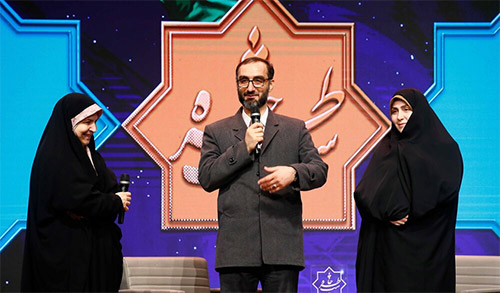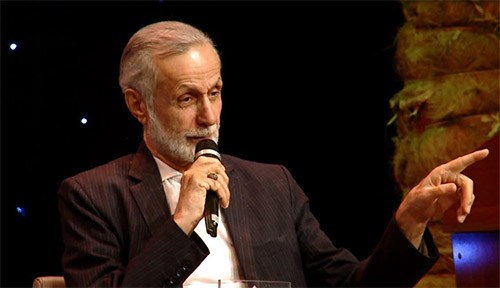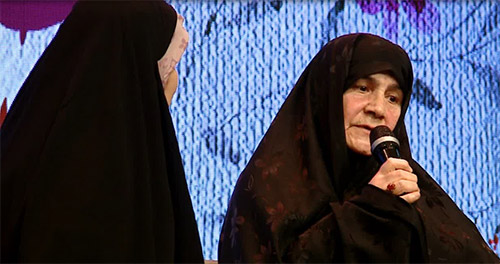The 354th Night of Memory -2
Compiled by: Leila Rostami
Translated by: Fazel Shirzad
2024-8-8
Note: The 354th Night of Memory program was held on January 26, 2023 in the Surah Hall of the Islamic Revolution Art Center under the title "Eternal Family". The narrators of this program were Masoumeh Eskandari, Mansoura Eskandari, Javad Eskandari, Mohsen Eskandari and Fatemeh Arabi, who discussed the observations and bitter events of the assassination of the Eskandari family by hypocrites and the events that followed. Also, the book "Eternal Family" was introduced by Masoumeh Ramehrmazi on the subject of the assassination of this family. The Night of Memory was performed by Mona Orei.
The second narrator of the program was Mansoura Eskandari. She was 4 years old on the day of the assassination when he was targeted by hypocrites. At the beginning of his memories, he said: I don't remember anything about my mother except the day of her martyrdom. After martyrdom of my mother, we were in 24-hour fear. I would never go a short distance without a companion. We even left the house with my father in the morning and I insisted on going to work with him. My father accompanied me and did not let this fear bother me more. Of course, his workplace was not very pleasant either. I remember once I saw a lot of dead bodies. During the war, it was natural to face these scenes; but I was happy to go with my father. It was 3 years before school. This dependence should be reduced. When I look back on those days, my parents were happy people.
The narrator continued to say: after the martyrdom of mom, it was not easy to control 4 children anyway. My uncle and cousin agreed to let me live with them for a few months. They coped with all my frowns and cries. My cousin had a crush on me even though she had several children. It was like everyone was practically at my service.
■

The third narrator of the program was Javad Eskandari, the eldest child of the family, who was 8 years old at the time of the accident. Although he was shot on the day of the assassination, he survived. He said: "In my childhood, I was playful and used to do tricks at home. But my mother was always happy, cheerful and kind. He mentioned the sensitivity of his martyred mother towards the defense of the Imam and the revolution and her arguments in the taxi and in the bakery line.
■

The fourth narrator, Mohsen Eskandari, the husband and father of the family, narrated the assassination incident as follows: I was in a different mood that morning. I was in a very bad mood. 10 minutes earlier than usual, we left the house with my brother. I was working when our neighbor Mr. Asgari called me that your family was assassinated. I returned home with my colleague in an army car. There was a knock at the door of the house. Men and women were crying. I entered the yard and saw that there was blood from the door to the kitchen, the breakfast table, the hall and the room. I pushed aside the carpet and saw the body of my wife who was shot in the forehead, chest and body and her body was completely cold. The glass and windows were all broken. Most importantly, the children were crying.
When I saw this scene, it was like the world really collapsed on me. The saddest day of my life was that day. I covered the body and hugged the children. I cried with them. The door was open and people could see us. Once I came to my senses. It's like God gave me a call that it's a special moment and you have to get up and do your mission. It occurred to me that now the enemy wants to take advantage. Because the hypocrites could not beat the officials of the regime in 1981 and even wanted to beat the Imam, but they could not; they said that we should come and beat the guards and those who are mostly enlightening and defending the revolution in the neighborhoods.
I knew the hypocrites and their programs since 1969. Since 1979, 1980, and 1981, we were negotiating with them at the intersection of Valiasr and Tehran University, and we removed 10 people from the organization. They thought that I was a very effective person as someone who had a class at the Javadalaima Mosque in Tehran-Pars district and was exposing. For this reason, they sent a letter to assassinate me. It is true that we felt in danger, but we were not afraid of martyrdom at all; because the revolution was the dearest thing for us. Some say they are crazy! We were not crazy, we were in love. We were not empty lovers, we were also wise; we had a wise love.
The narrator went on to say: I once felt threatened that now the enemy is telling the people that if you defend the revolution, your fate will be like that of Alexandria. I got up and went to the door. I gave a speech for about half an hour and said: Imam said, kill us, our nation will become more awake. The hypocrites and the hypocrites should know that no matter what they kill from us, they will rise up better than us and stand in front of them. Let them know that the revolution is a divine revolution and it will not stop in front of the crimes of the hypocrites, Kurds and terrorists. I said to the people: People! Don't be afraid, the end of the line is martyrdom and we are not afraid of martyrdom. In the afternoon, a lady came and said: Mr. Eskandari! While you were talking, two people were standing behind me, they said, Oh! ... We thought they beat this so-and-so! That is still alive!
The impact of that speech was so great that it destroyed the dignity of the organization and changed the atmosphere of the region and the people. People felt that we are up to the task. Those who made a revolution do not return from the revolution for a moment. God knows that the revolution was dearer to us than anything else. Even now, at the age of 72, we are fighting in the cultural field.

The fifth narrator, Fatemeh Arabi, was the second wife of Mohsen Eskandari, whom the children called "Mother Fatemeh". The first spouse of "Mother Fatemeh" was martyred in Kurdistan by Komle and the Democratic Party. He said about the story and the conditions of his marriage with Mohsen Eskandari: I made a condition with him that I am young and since I did not have children, you should be my guide so that just as Umm al-Banin (PBUH) was a good mother to the children of Zahra (PBUH), I can also be a good mother for these children of martyr. I also asked him to allow me to go to cemetery Behesht Zahra (PBUH) every week and to the grave of my first wife, martyr Hojjat, which he also accepted.
She had a daughter and a son from Mohsen Eskandari and said about the difficulty of raising 6 children at the same time: For example, when we wanted to board the bus, I had to pick up the children one by one and put them inside the bus. They would get upset and say that if you have to drag six children behind you, you will delay us here. Many people were also heartbroken and came to hold the children's hands.
Number of Visits: 1066








The latest
- An Eternal Lie!
- The 368th Night of Remembrance – Part 2
- Agents in Search for the Fighter
- The Embankment Wounded Shoulders – 13
- The Necessity of Standardizing Oral History and Criticism of General Mohsen Rezaei
- The 368th Night of Remembrance – Part 1
- Oral History News of Khordad 1404 (May 22nd – June 21st 2025)
- Najaf Headquarters Human Resources
Most visited
- Najaf Headquarters Human Resources
- Oral History News of Khordad 1404 (May 22nd – June 21st 2025)
- The Necessity of Standardizing Oral History and Criticism of General Mohsen Rezaei
- The 368th Night of Remembrance – Part 1
- The Embankment Wounded Shoulders – 13
- Agents in Search for the Fighter
- The 368th Night of Remembrance – Part 2
- An Eternal Lie!
Operation Beit al-Moqaddas and Liberation of Khorramshahr
After Operation Fat’h al-Mobin, we traveled to Kermanshah and visited Sar-e-Pol-e-Zahab before heading to Ilam. During Operation Beit al-Moqaddas, the 27th Brigade was still receiving support from the West. We maintained contact with individuals who had previously worked in Area 7 and were now leading the brigade. It was through these connections that I learned about Operation Beit al-Moqaddas.Memoirs of Hujjat al-Islam Reza Motalebi
Hujjat al-Islam Reza Motalebi is a cleric from Isfahan. Before the revolution, he was the imam of the Fallah Mosque – which was later renamed Abuzar Mosque. By his presence and efforts, Abuzar Mosque soon became a base for supporters of the Imam and the revolution. After the victory of the revolution, he played a role in uniting forces and maintaining political vitality in southwest Tehran.The Necessity of Receiving Feedback in Oral History
Whenever we engage in a task, we naturally seek ways to evaluate our performance — to correct shortcomings and enhance strengths. Such refinement is only possible through the feedback we receive from others. Consider, for instance, a basketball player whose shots are consistently accurate; should he begin shooting blindfolded, his success rate would rapidly decline, as he would be deprived of essential feedback from each attempt.Sir Saeed
The book “Sir Saeed” is a documentary [narrative] of the life of martyr Seyyed Mohammad Saeed Jafari, written by Mohammad Mehdi Hemmati and published by Rahiyar Publications. In March 2024, this book was recognized as one of the selected documentary biographies in the 21st edition of the Sacred Defense Book of the Year Award. The following text is a review on the mentioned book.

